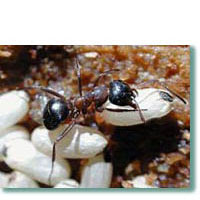Ants Have Uncles, Too
 My wife and I were listening to a recording of Oliver Twist while we were traveling last weekend, and my ears perked up when a word that I had not heard in ages impinged upon my consciousness. Here’s the passage, from Chapter XLIV:
My wife and I were listening to a recording of Oliver Twist while we were traveling last weekend, and my ears perked up when a word that I had not heard in ages impinged upon my consciousness. Here’s the passage, from Chapter XLIV:"Fagin walked towards his home, intent upon the thoughts that were working within his brain. He had conceived the idea--not from what had just passed though that had tended to confirm him, but slowly and by degrees--that Nancy, wearied of the housebreaker's brutality, had conceived an attachment for some new friend. Her altered manner, her repeated absences from home alone, her comparative indifference to the interests of the gang for which she had once been so zealous, and, added to these, her desperate impatience to leave home that night at a particular hour, all favoured the supposition, and rendered it, to him at least, almost matter of certainty. The object of this new liking was not among his myrmidons."
Myrmidons has gone through almost two dozen spelling changes in its long life, but they are all due to translations of the Iliad [2, 684]. The Myrmidons were fierce, war-loving inhabitants of the Isle of Aegina, and Achilles was their leader in the Iliad’s time frame.
At one point in their early history, goes the story, the entire population of the island was destroyed by a plague. King Aecus, king of Aegia and son of Zeus, prayed to his father for help. During his prayers, his eyes lit on a nearby ant hill, and he fervently prayed for citizens as numerous as the long line of ants. Zeus transformed those ants into humans, and the island was repopulated. Not by coincidence, the word for ants was myrmekes. An expert in ant behavior is known as a myrmecologist.
By Shakespeare’s time, the word meant a member of a bodyguard or retinue; a faithful follower; one of a group or team of attendants, servants, or assistants. By mid-17th century, it had taken on a negative cast: a member of a gang or army adhering to a particular leader; a hired ruffian or mercenary. By the 1800s, myrmidon referred to an opportunistic or sycophantic supporter; a hanger-on.
It has been popular in literary use, as a sampling will show:
• 1609 William Shakespeare, Troilus & Cressida, V. vii. 1: “Come here about me you my Myrmidons, Marke what I say, attend me where I wheele.”
• 1666 Samuel Pepys, Diary,VII. 204: “He spoke contemptibly of Holmes and his Mermidons that came to take down the ships from hence.”
• 1748 Samuel Richardson, Clarissa, III. xiii. 88: “Who knows what consequences might have follow'd upon..my projected visit, followed by my Myrmidons?”
• 1749 Henry Fielding, Tom Jones, V. XV. v. 224: “The Door flew open, and in came Squire Western, with his Parson, and a Set of Myrmidons at his Heels.”
• 1816 Thomas Love Peacock, Headlong Hall, ii: “His myrmidon on this occasion was a little red-nosed butler.”
• 1821 Walter Scott, Kenilworth, I. i. 5: “Which produced the following dialogue betwixt the myrmidons of the bonny Black Bear [sc. hostler and tapster].”
• 1896 Henryk Sienkiewicz, Quo Vadis, x. 87: “He felt that it was more appropriate to receive her at home than to go in the rôle of a myrmidon to the palace.”
• 1927 Sinclair Lewis, Elmer Gantry, iii. 45: “No timid Jesus did he preach, but the adventurer who had..dared to face the soldiers in the garden, who had dared the myrmidons of Rome and death itself!”
SIDEBAR: How to get rid of ants
SIDEBAR: Hear Adam Ant


Comments